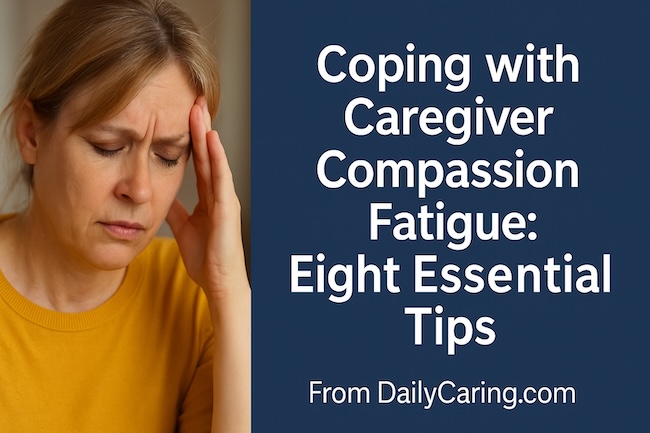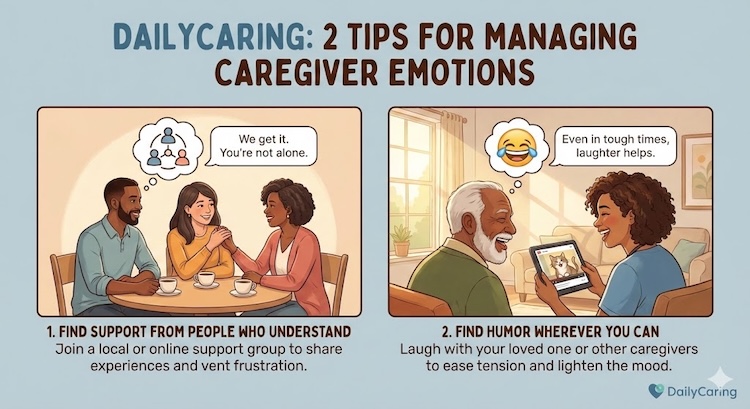That nagging voice in your head that whispers, “I should be doing more,” or replays every perceived shortcoming on a loop. This is the heavy weight of caregiver guilt. It's a constant, draining companion for so many, convincing you that you're never quite enough, no matter how much you sacrifice.
What if you could quiet that inner voice down? What if addressing this guilt wasn't just about feeling better emotionally, but was actually crucial for your physical and mental health?

Let's explore seven powerful ways to lighten this burden, transforming guilt from a source of suffering into a catalyst for healthier well-being.
We tend to hold ourselves to unreasonable standards, such as being able to do everything without help, having a solution for every problem, always making the “right” decision, never getting upset or frustrated, and more.
Caregiver Guilt Adds to Stress and Worsens Health
None of that is realistic, yet we criticize ourselves when we inevitably fall short of the inhuman expectations.
We explain what causes caregivers to feel guilty, why it’s so destructive to health, and share seven ways for dealing with caregiver guilt that improve your health and well-being.
What Causes Caregivers to Feel Guilty?
As a caregiver, it might seem like there’s nothing you don’t feel guilty about.
You might feel guilty about:
- Feeling resentful, trapped, unloving, or having other negative thoughts
- Feeling that you’re not as good a caregiver as you should be or that others are doing a better job
- Not visiting enough
- Wishing it was over
- Wanting time for yourself, asking for help, hiring an in-home caregiver, or using respite care so you can have a much-needed break
- Not feeling guilty or feeling happy
- Realizing how you treated or judged someone with dementia before knowing what was causing their behavior
- Doing things without your older adult that you used to enjoy together
- And more…
Why Guilt is Destructive for Caregiver Health
Common misconceptions about how caregivers should feel or what they should do, and the guilt that comes from not living up to those unreasonable standards, can really hurt you.
These beliefs can lead you to take on unrealistic responsibilities, avoid seeking the help you need and deserve, and be overly critical of yourself.
All these things add to your stress, worsen health, and can lead to poor lifestyle choices.
Finding ways to address caregiver guilt positively helps you make choices that improve your overall well-being.
7 Ways of Dealing with Caregiver Guilt
1. Acknowledge that you feel guilty
The first step in solving a problem is to admit that it exists. When you suppress a feeling, it only becomes more intense.
Identify when you feel guilty and acknowledge your thoughts and emotions. That can help reduce the feeling and let it pass.
For example, say “I feel guilty because I snapped at mom this morning over something trivial because I’m exhausted,” or “I feel guilty because I didn’t visit dad today because I need some time to recharge.”
2. Check your expectations against reality
Having unrealistic expectations causes unnecessary guilt.
When you think “I should be able to take care of everything without feeling resentful or exhausted,” check that against reality.
Would you really expect all other caregivers to be able to do that and maintain it forever? No, of course not. It’s unrealistic and not something you should expect of yourself.
Or, if you think “I should never move my older adult to assisted living or nursing care, no matter what,” think about the reality of the situation.
There are so many situations where keeping someone at home is unrealistic and could cause serious harm to the older adult or the caregiver.
If a friend had told you about a situation like that, you would agree that a move is the best solution for everyone’s health and safety.
3. Don’t compare your worst moments with someone else’s highlight reel
Based on what you might see or hear about other caregivers, it could seem like they’re doing a better job.
You might think they’re better at coping with stress, hands-on care, working with family, or finding resources.
The truth is that you only know about a small part of their lives.
It’s neither realistic nor fair to compare what little you know about their situation to your everyday caregiving reality. Most likely, they’re struggling just as much as you are – or more.
In this situation, it’s helpful to be honest with yourself about how realistic your expectations are.
Nobody can do everything on their own, and there is no such thing as a perfect caregiver.
Set yourself up for success by setting achievable goals, getting help with caregiving, and taking time to care for yourself. That’s what keeps you going in the long run.
4. Use positive coping strategies
Feelings of guilt can also be softened with positive self-care techniques.
Writing in a journal, scheduling regular breaks, and using quick, simple relaxation techniques can significantly improve your overall well-being.
5. Reframe guilt as regret
It’s impossible to do everything that theoretically “should” be done. This is the real world, and there are always trade-offs that have to be made.
Instead of thinking, “No one does as good a job caring for mom, so I’m the one who has to be here all the time,” reframe that into “This is a difficult situation, but it’s not realistic for me to never take breaks and care for myself. I regret that I’ll need to make the tough choice to let someone else help, but it has to be done to allow me to keep caring for mom over the long term.”
And “I’m a terrible person for getting frustrated and angry yesterday” would instead be “I regret that sometimes I snap, but I know that I’m only human and am doing my best.”
6. Get support
A caregiver support group is a great place to meet people who are in situations similar to yours.
They’ll understand how you’re feeling and are likely to have their own stories of caregiver guilt.
Hearing from others helps you see that you’re not alone in feeling like this – and that you’re probably not being fair to yourself.
7. Remind yourself of your many positive accomplishments
Guilt makes us think of all the ways we’ve failed to meet our too-high standards.
And we forget to think about all the wonderful things that you have done for your older adult.
Recognizing and appreciating your caregiving accomplishments is essential. It reduces stress, boosts mood, and increases self-respect and confidence.
Final Thoughts About Caregiver Guilt
Remember, feeling guilty doesn't mean you're a bad caregiver. In fact, it often signals the exact opposite – a deep, compassionate love for your care recipient. By practicing these strategies, you are not being selfish; you are performing critical maintenance on your most crucial caregiving tool: yourself.
Releasing the grip of guilt frees up immense energy—energy that can be redirected into more compassionate and sustainable care. Be kind to your mind, because you are doing one of the most demanding jobs there is, and that is more than enough.
Recommended for you:
- 5 Tips for Dealing with Caregiver Guilt in Dementia Care
- 8 Ways to Relieve Caregiver Anxiety and Improve Well-Being
- Caring for the Caregiver: 6 Ways to Get Help and Improve Your Health
About the Author

Connie is the founder of DailyCaring.com and was a hands-on caregiver for her grandmother for 20 years. (Grandma made it to 101 years old!) She knows how challenging, overwhelming, and all-consuming caring for an older adult can be. She also understands the importance of support, especially in the form of practical solutions, valuable resources, and self-care tips.













